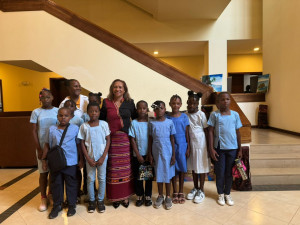Ministry of Education takes part in the III International Seminar on School Feeding in the CPLP and High Level Conference

The Ministry of Education of Timor-Leste, represented by Minister Dulce de Jesus Soares, accompanied by the respective delegation, took part in the III International Seminar on Good Practices in School Feeding and the High-Level Conference, held from 3 to 5 December 2024, in São Tomé and Príncipe. The event, held as part of São Tomé and Príncipe's rotating presidency of the Community of Portuguese Speaking Countries (CPLP), brought together representatives from member states to discuss innovative and sustainable strategies for school feeding programmes. 
With the theme “Youth and Sustainability in the CPLP,” the seminar focused on exchanging experiences on initiatives that integrate school nutrition with local production, promoting economic development, health and education. The Timor-Leste technical team highlighted the progress of the School Meals Programme, with the theme “Challenges, Opportunities, Strategies and Solutions: School Feeding Programmes versus Food and Nutrition Education and Healthy and Sustainable Eating,” also underlining the role of relevant institutions, the inclusion of local products in school menus and efforts to strengthen the pedagogical garden, as well as monitoring and evaluating the implementation of the School Meals Programme.
In addition to the discussions, the event was attended by the Minister of Education of Timor-Leste, Dulce de Jesus Soares, and other members of the CPLP Education government at a High-Level Conference organised by the World Food Programme (WFP), which presented the School Feeding Coalition as a platform for global cooperation. The East Timorese leader also took part in the plenary session on “From Commitments to Progress: National Commitments in Action,” where the progress made by member states in implementing the commitments of the School Feeding Coalition was presented. 
The High-Level Conference was also marked by the signing of the Declaration of Accession to the School Feeding Coalition, signed by the Ministers of Education of the CPLP member states, or their representatives, within the framework of the High-Level Conference on the School Feeding Coalition.
The participants in the High-Level Conference on Food in the CPLP concluded and recommended the following:
- School feeding programmes have been recognised as fundamental in the fight against poverty, hunger and inequality, as they foster access to education, social and gender equity; defend local farmers and food systems; support climate resilience; create new jobs; and boost economic growth and prosperity.
- School feeding programmes have been recognised as the main accelerators for achieving the SDGs.
- School meals have been recognised as a strategic investment, being the largest food safety net in most CPLP countries, as they enable the transfer of resources (monetary and in kind) to vulnerable families in hard-to-reach areas, transforming schools into development hubs and activating local demand for seasonal, local and fresh food.
- Welcome the fact that the CPLP member States, as an organization, have joined the School Feeding Coalition and encouragement to continue working together to present regional commitments to the SMC Secretariat.
- Sensitizing member States to prepare and submit national commitments to the SMC Secretariat before the next Global Summit, scheduled for September 2025 in Brazil.
- Raising awareness among member States of the importance of universal coverage of these programs, as soon as possible, based on the multiple impacts that school meal programs have on children's education and nutrition, as well as the indirect effects on the economic fabric of school communities.
- Sensitizing CPLP member States to promote measures that increase the quality of locally produced school meals, with the concrete aim of doubling the number of children receiving daily school meals by 2030 and, hopefully, achieving universal coverage, within the framework of the Global Alliance Sprint Action.
- Emphasizing the importance of schools as development hubs, particularly in terms of a. local purchases; b. budget allocations; c. nutritional improvements (school gardens); d. energy for food security (using solar and wind panels, replacing firewood with gas, opting for ecological cookers); e. infrastructure rehabilitation (improving/building latrines, water pumps, kitchens, storerooms, canteens); and f. teaching materials, among others.
- Encouraging partnerships with UN agencies, donors and civil society organizations (UNICEF, UNESCO, FAO, ADB, IFAD, Portuguese Cooperation, EU, among others).
- Ressaltada a importância da Cooperação Sul-Sul e Norte-Sul entre países com diferentes níveis de implementação de programas de alimentação escolar, para partilha de experiências de enriquecimento mútuo. Emphasizing the importance of the South-South and North-South Cooperation among countries of different levels of the school feeding program implementation, to share experiences of mutual enrichment.
- Encouragement to CPLP member states and to the Executive Secretariate in finding inovative financing mechanisms, such as debt swaps for school feeding, debts buyback schemes, tax-linked funds and additional grants and loans for school feeding programs.
Timor-Leste's participation reaffirms the country's commitment to the Sustainable Development Goals (SDGs), especially in the areas of education and food security. The exchange of good practices with other CPLP countries strengthens national policies and contributes to healthier and more inclusive food for Timorese students.
. One lesson learnt from Brazil and Portugal is the inclusion of nutritionists in education, especially in school meals.
. Nutritionists play a crucial role in developing balanced diet plans, helping to improve the quality of education and prevent diseases related to poor diets.
In schools, the inclusion of nutritionists can ensure that children receive clear guidance on healthy food choices.










































